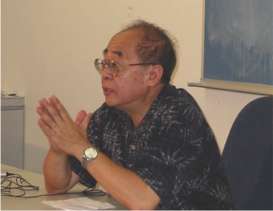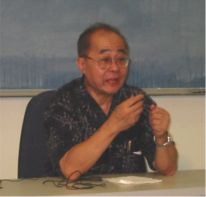
Arriving to the United States from Taiwan in 1964, Mr. Hsin Yuan Cheng, an immigrant with an extensive background in journalism and broadcasting, has spent more than thirty years of his life immersed in the hustle and bustle of Chinatown. Over the past three decades, from 1970 to 2000, he has both reported and witnessed first hand the rise and fall of gangs in Chinatown.
After the immigration laws were repealed in 1965, the population from abroad increased substantially in the United States, including that of the gangs in Chinatown, since the government at that time had not been prepared to screen for such individuals. As the membership of gangs increased during the 1970s, their power reigned supreme in the 1980s.
Strangely enough, it was due to the collapse of the former Soviet Union that lead to the demise of the gangs in Chinatown during the mid-1990s, as law enforcement agencies focused their attention from abroad to home, and cracked down hard on organized crime. Over the past five years, cases of extortion in Chinatown have almost been unheard of, leaving only illegal immigration to become the current criminal trend.

1970s
After attending graduate school at Seton Hall University, Mr. Cheng arrived in Chinatown looking for a job, of which he found immediately as a dishwasher through a local employment agency. Soon afterwards, he met the owner of a newspaper, who gave him a job as the editor-in-chief, becoming the youngest person at the time to attain such a position.
During this time, illegal gambling houses became increasingly popular within Chinatown. As thousand of dollars exchanged hands at the tables every night, the need for protection became evident, and the courting of young Chinese immigrants into the folds of gangs soon skyrocketed. Facing discrimination in schools, members as young as 15 years old grouped together in order to protect themselves from their white and black counterparts, bringing about the White Eagle, Ghost Shadow and the Flying Dragons.
After an article written on police brutality against a Chinese civil engineer, Mr. Cheng resigned under pressure from his boss who feared it would lead to an increase of police raids on gambling houses.
1980s
Securing a job as a broadcaster, Mr. Cheng saw firsthand the ferocity of gangs up close and personal. A rather innocent article written by a member of his staff displeased certain gang members, who broke into his office one day. Confronted by five armed men, Mr. Cheng was given the option of hosting a dinner banquet in their honor and apologizing in front of all their friends for the offending article. Unable to comply with such a request, a solution was finally reached when Mr. Cheng’s associate sought help from Uncle Seven, a man of tremendous influence in Chinatown, who arranged a banquet, where a roast pig would be offered to appease the gang members, without any public humility on Mr. Cheng’s part.
Then Atlantic City began to lure people into its casinos, leading to a decline in profit for gambling houses in Chinatown. Some gangs went into the narcotics business, while others focused mainly on extortion. While high profile members made as much as 20 thousand dollars a week, small time gang members often got by with as little as only 50 dollars a week.

1990s
By the mid-1990s, the collapse of the Soviet Union has allowed the FBI to shift their focus from foreign menace to internal threats. As a result of increased vigilance by law enforcement agencies, organized crime in Chinatown was dismantled. Gangs were broken up, and Chinatown businesses were finally free from the terror of extortion tactics by rival gangs.
Today, Chinatown is a changed community. It is no longer the seedy place of tong havens once projected by the American media, but a growing community of immigrants, first and second generation Chinese Americans. Still, that is not to say that Chinatown has totally gotten rid of crime. Illegal immigration from abroad has increased over the past few years. After the attacks on the World Trade Center on September 11th , however, the ability to smuggle immigrants into the country has become increasingly difficult, as all possible ports of entry are being watched closely. Since then, there has been a noticeable decline in illegal immigration.
Synopsis by Antony Wong

